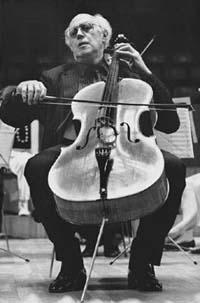Rostropovich Cello Competition
 I plugged the qualifying test hearings of the Rostropovich Cello Competition in my weekly column at DCist on Sunday. The North American qualifying round is being held here in Washington this week, at the Embassy of France, La Maison Française. Considering that you can hear 32 young cellists, over three days of hearings, for free, with Mstislav Rostropovich himself chairing the jury, this event has not received a lot of press. Sitting in on some of the qualifying hearings will make following the final competition, planned for November 9 to 20 in Paris, that much more interesting.
I plugged the qualifying test hearings of the Rostropovich Cello Competition in my weekly column at DCist on Sunday. The North American qualifying round is being held here in Washington this week, at the Embassy of France, La Maison Française. Considering that you can hear 32 young cellists, over three days of hearings, for free, with Mstislav Rostropovich himself chairing the jury, this event has not received a lot of press. Sitting in on some of the qualifying hearings will make following the final competition, planned for November 9 to 20 in Paris, that much more interesting.
So Ionarts was there to hear about half of the first day's candidates on Tuesday afternoon. Prior to that, if someone had suggested that I listen to the Ligeti Sonata for Solo Cello four times in a row, I probably would have laughed. But there I was, doing precisely that. The competition rules for the qualifying test specify that the candidate must play two selections: the prelude (mandatory) and one or two dance movements of any one of the six unaccompanied cello suites by J. S. Bach, followed by the candidate's choice from a list of 20th-century unaccompanied works. How did the 32 candidates in Washington decide? Ligeti, 13; Crumb, 10; Hindemith, 5; Britten, 4. To my chagrin, no one at all chose to play the Sacher variations, either version, by Dutilleux or Lutosławski. For the third and fourth hearings of the Ligeti sonata on Tuesday afternoon, I heard one of the judges whisper, "Encore?" (Again?). What is it with young cellists and Ligeti?
Actually, that is one of the most interesting things about attending these qualifying tests. Who are the world's best young cellists and what do they like to play? Yes, they have to play certain things, but when given a choice, what do they choose? Not only Ligeti, since three of the four candidates I heard who chose Ligeti also chose Bach's sixth suite. According to the program, the oldest candidates are 32 years old (the cutoff age is 33), and the youngest is, jaw-droppingly, American Alan Toda-Ambaras, 14 years old (the closest to him in youth is another American, 16-year-old Sebastian Bäverstam). Most of the candidates are in their 20s.
The stress of competitions always creates some heartbreak, and there was some on Tuesday afternoon. However, to focus on the positive, I heard two exceptionally fine performances. French cellist Yves Dharamraj (graduated from Yale, now studying with Joel Krosnick at Juilliard) was my personal favorite, with a big, broad sound, great dynamic contrasts, and a good rhythmic pulse (Fournier-like) in the sixth suite's difficult prelude (maintained with stunning clarity in the 32nd-note section at the end). For my money, at a close second, was Spanish cellist Alexander Friedhoff (studies at Indiana and Rice), who in spite of the bad habit of very heavy, dramatic breathing, turned in a very good performance of the Ligeti sonata, with some fine qualities that competed seriously with that of Dharamraj. Who knows how the jury will call things, but I would not be surprised to see one or both of those players make it to the next round.
The qualifying tests continue (22 cellists remain to be heard in Washington) on Wednesday (August 3, from 2 to 6:30 pm) and Thursday (August 4, from 12 to 3:30 pm). You may hear them for free, at La Maison Française (4101 Reservoir Road NW), but you must make a reservation, by telephone (202-944-6090 or e-mail (Culturel.WASHINGTON-AMBA@diplomatie.gouv.fr).
UPDATE:
Cecelia Porter was at the qualifying tests on Wednesday (Cello Players Compete For Rostropovich's Ear, August 5) for the Washington Post.




















































No comments:
Post a Comment